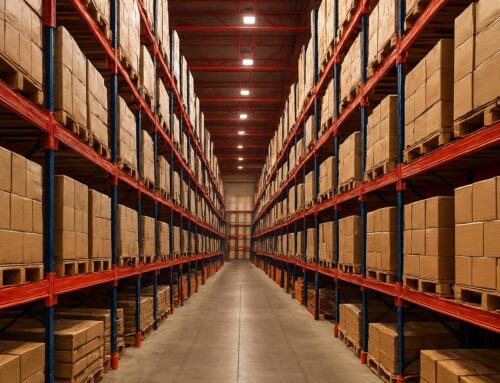The e-commerce landscape has evolved rapidly, and with it, customer expectations have reached new heights. Today’s online shoppers expect fast, accurate deliveries, real-time updates, easy returns, and a seamless overall experience.
This shift has placed significant pressure on businesses to optimise their order fulfilment processes or risk falling behind. From small startups to large retailers, staying competitive means more than just having a great product—it requires operational efficiency, smart logistics, and a customer-first mindset.
Looking for help meeting rising customer demands? Call Brenda on 01992 511051 or visit www.tasshertford.co.uk — we’re here to support your e-commerce growth.
In this article, we’ll explore how businesses can keep up with rising customer demands through improved fulfilment strategies, technology adoption, and scalable solutions that not only meet expectations but exceed them in a highly dynamic and demanding market.
What is Order Fulfillment?
Order fulfillment is the process of receiving, processing, and delivering customer orders. It involves all steps from the initial point of sale to final delivery and may also include returns or exchanges.
The goal of order fulfillment is to ensure that customers receive their purchases in a timely and satisfactory manner. This not only leads to happy customers but also helps businesses achieve higher levels of customer retention and loyalty. Also, efficient order fulfillment can help businesses scale and grow by increasing sales and improving brand reputation.
Understanding the Modern E-commerce Customer
The modern e-commerce customer is more empowered than ever before. With unlimited access to information and products, customers have higher expectations when it comes to the online shopping experience. They expect convenience, speed, and personalised service at every touchpoint.
To stay competitive in today’s market, businesses must understand their customers’ needs and preferences. This means gathering data on consumer behaviour, preferences, and feedback through various channels such as social media, surveys, and analytics tools.
At TASS Hertford, we work closely with brands to align fulfilment operations with customer expectations. Visit www.tasshertford.co.uk or call on 01992 511051 to learn how we help brands stay in tune with their audience.
Why Customer Demands Are Rising
Customers today have high expectations when it comes to online shopping. They want a fast, convenient, and personalised experience every step of the way. This is due to several factors:
- Increased competition: With the rise of e-commerce, customers have more options than ever before. If a business can’t meet their demands, they will simply go to a competitor.
- Technological advancements: The advancement of technology has made it possible for customers to shop anytime, anywhere, and on any device. This has led to an increase in demand for convenience and speed.
- Changing demographics: The younger generation, also known as digital natives, are used to getting things instantly. They expect the same level of service when it comes to online shopping. This demographic is becoming the driving force behind the growth of e-commerce.
- Social media influence: With the rise of social media, businesses have a new way to reach and engage with potential customers. Influencers and user-generated content can greatly impact purchasing decisions, making it important for businesses to have a strong presence on social media platforms.
TASS Enterprise helps brands respond to customer expectations with reliable fulfilment, fast despatch, and friendly service. Call 01992 511051 to see how we can support your logistics.
Key Challenges in E-commerce Fulfilment
E-commerce fulfilment plays a crucial role in shaping the customer experience. While online shopping continues to grow, so do the pressures on fulfilment operations. Businesses must not only process orders quickly and accurately but also manage inventory, shipping, and returns efficiently. Meeting rising expectations while maintaining profitability is no easy task.
Here are the key challenges that make e-commerce fulfilment increasingly complex.
1. Inventory Management and Stock Visibility
Maintaining accurate, real-time inventory is one of the biggest challenges in e-commerce fulfilment. When selling across multiple platforms—such as your website, Amazon, and other marketplaces—stock levels need to be updated instantly. Without proper synchronisation, businesses risk overselling popular items or running out of stock, both of which frustrate customers and damage brand reputation. Lack of visibility also makes it difficult to forecast demand accurately, especially during seasonal peaks or promotional campaigns.
2. Speed and Accuracy of Order Processing
Modern customers expect same-day or next-day delivery, especially in competitive markets. This puts pressure on businesses to pick, pack, and dispatch orders with speed and precision. Mistakes such as incorrect items, damaged packaging, or delayed shipments can lead to returns, negative reviews, and lost customer trust. High order volumes, especially during holidays or sales, further strain fulfilment systems that are not built for scalability.
3. Managing Returns and Reverse Logistics
Returns are a normal part of e-commerce, but handling them efficiently can be a logistical nightmare. Customers expect easy, no-hassle return processes, and businesses must ensure items are received, inspected, restocked, or refunded quickly. Reverse logistics add complexity to warehouse operations and can increase costs significantly, especially for products that are damaged, seasonal, or difficult to resell. Poorly managed returns can impact customer satisfaction and erode profit margins.
4. Labour Shortages and Workforce Management
Warehousing and fulfilment centres rely heavily on labour for picking, packing, and shipping orders. However, many regions face labour shortages, especially during peak seasons. Recruiting, training, and retaining skilled workers is a growing concern, particularly for small to mid-sized businesses that can’t afford high turnover or constant hiring cycles. Without enough hands on deck, delays become inevitable, and service quality suffers.
5. High Delivery Costs and Last-Mile Challenges
The “last mile” of delivery—getting the product to the customer’s doorstep—is often the most expensive and difficult part of fulfilment. With customers expecting fast and often free shipping, businesses are forced to absorb rising courier costs, fuel prices, and failed delivery attempts.
Managing deliveries in rural or hard-to-reach areas adds another layer of complexity. Balancing cost-efficiency with delivery speed is a daily struggle for many businesses. Want to reduce delivery delays and keep costs under control? Let’s talk. Call Brenda on 01992 511051 today.
6. Scalability and Technology Integration
Many small businesses begin with basic tools like spreadsheets or simple order management systems, which quickly become inadequate as order volumes grow. Scaling up requires investment in robust systems like warehouse management software (WMS), automation tools, and integration across sales channels and couriers. Without the right tech stack, businesses risk inefficiencies, order delays, and customer dissatisfaction.
How to Keep Up With Rising Customer Demands
Now more than ever, customers expect fast, reliable, and convenient service from businesses. With the rise of e-commerce and online shopping, consumers have become accustomed to receiving their orders quickly and efficiently. As a business owner, it’s important to keep up with these rising customer demands in order to stay competitive in today’s market.
Here are some tips on how to keep up with rising customer demands:
- Invest in technology
Investing in technology is crucial for staying ahead of customer demands. This includes tools such as warehouse management software (WMS), automation tools, and integration across sales channels and couriers. These systems help streamline processes and increase efficiency, allowing orders to be fulfilled faster and with fewer errors.
We use best-in-class tools to help you deliver better, faster, and more accurately. Need help upgrading your fulfilment stack? Visit www.tasshertford.co.uk.
- Utilize data
Data plays a major role in understanding customer demands and behavior. By analysing data from sales, returns, website traffic, and customer feedback, businesses can gain valuable insights into what their customers want and how they prefer to shop. This information can then be used to improve products, services, and overall customer experience.
- Stay adaptable
In today’s fast-paced market, it’s important for businesses to be adaptable. This means being able to quickly adjust processes or strategies based on changing customer demands. For example, if there is a sudden increase in online shopping, businesses should be able to pivot their focus to e-commerce and ensure their website is equipped to handle the influx of traffic.
- Partner with reliable 3PLs
Outsourcing logistics to a reliable third-party logistics (3PL) provider can greatly benefit businesses, especially during peak seasons. These companies specialise in managing and optimising supply chains, allowing businesses to focus on other areas of their operations. However, it’s important to carefully research and select a reputable 3PL that aligns with the business’s needs and values.
- Invest in customer service
During busy periods, customer service can make or break a business. With increased competition and easily accessible online reviews, providing excellent customer service is more important than ever. Businesses should invest in training their employees to handle high volumes of inquiries and complaints effectively while maintaining a positive attitude.
- Plan for contingencies
Despite all efforts and preparations, sometimes things may still go wrong. Businesses should have a contingency plan in place for unforeseen circumstances such as natural disasters, supplier delays, or other disruptions to the supply chain. This will help minimise the impact on operations and maintain customer satisfaction. It’s important to regularly review and update these contingency plans to ensure they are effective in handling potential issues.
The Role of the AutoStore System in Supply Chain Management
The AutoStore system plays a pivotal role in modern supply chain management by revolutionising how inventory is stored and retrieved. It is an automated storage and retrieval system designed to maximise efficiency, space utilisation, and operational performance.
One major advantage is its ability to optimise warehouse space. By stacking bins vertically and using robots to retrieve items, AutoStore reduces the footprint required for storage, enabling businesses to store more products in less space. This is especially valuable for companies dealing with limited warehouse capacity.
Operational efficiency is another key benefit. The system automates tasks like picking, packing, and sorting, significantly reducing reliance on manual labor and minimising human error. This results in faster order processing and improved accuracy, which are critical for meeting customer demands.
Supporting Brands with Reliable Fulfilment
At TASS Hertford, we work with an incredible range of e-commerce brands — including GoMate Drinks, UNLTD. Beer, Sakuranna Swimwear, and Nooi Nootropic Drinks. We support them with everything from daily pick-and-pack to custom influencer kits.
Whether you’re shipping supplements, swimwear, or smart drinks — we treat your stock like it’s our own. From urgent requests to long-term support, we go above and beyond.
Call Brenda today on 01992 511051 or visit www.tasshertford.co.uk to learn more about how we care for our clients.
Our Full Range of Services
We don’t just store pallets — we help businesses grow. Here’s what we offer:
- Pallet storage – secure, flexible, short- and long-term options
- Pick, pack and despatch – scalable and accurate for growing brands
- E-commerce fulfilment – fully integrated with platforms like Shopify, Amazon FBA, and TikTok Shop
- Contract packing – gift hampers, subscription boxes, seasonal packs
- Influencer gifting – beautifully wrapped, branded, and handwritten
- Container unloading and palletising
- Food and drink logistics – ideal for snacks, supplements, and beverages
- Worldwide shipping – fast, affordable, reliable
- Business storage – stock, documents, and equipment
- Office space and hot desking – bright, fully equipped workspaces with parking
Whatever you need, we’ve got you covered. Call Brenda today on 01992 511051 or visit www.tasshertford.co.uk.
Real-World Success: What Leading Brands Do Right
Top e-commerce brands set the standard for fulfilment by focusing on speed, accuracy, and customer experience. Their success isn’t just about resources—it’s about smart strategies that keep operations efficient and customer-focused.
One key strategy is fulfilment automation. Tools like barcode scanning and robotic pick-and-pack systems reduce human error and speed up processing. Brands like ASOS and Zalando use automated warehouses to dispatch thousands of orders quickly.
Another strength is integrated inventory systems. Companies like Gymshark and Boohoo ensure real-time stock visibility, reducing overselling and helping customers see accurate availability. This also improves demand forecasting and avoids costly stockouts or excess inventory. Top brands excel at returns management too. Zappos, for example, offers free and simple returns, boosting customer trust and encouraging repeat purchases.
Many successful e-commerce businesses partner with third-party logistics (3PL) providers. Brands like Allbirds and Glossier outsource fulfilment to logistics experts, enabling faster, cost-effective deliveries while focusing on product development and branding. Finally, sustainability is a growing advantage. Patagonia and Everlane use eco-friendly packaging and carbon-neutral shipping, appealing to environmentally conscious shoppers and driving loyalty.
The best e-commerce brands succeed by being proactive. They invest in smart logistics, customer-first policies, and scalable systems to meet high expectations and grow with confidence.
Future-Proofing Your Fulfilment Operations
Future-proofing your fulfilment operations is essential in today’s rapidly evolving market. To stay competitive, businesses must adopt scalable technology. Implementing advanced systems such as warehouse management software (WMS) and predictive analytics ensures that processes can expand seamlessly as demand grows. These tools enhance efficiency and enable informed decision-making based on real-time data.
Investing in automation is another critical strategy. Automated picking, packing, and sorting systems not only reduce labor costs but also improve speed and accuracy, helping to meet rising customer expectations. Robotic systems and AI-driven solutions can handle high volumes, ensuring operations remain efficient during peak periods.
Lastly, staying adaptable to market trends is vital. Regularly assess changes in customer behavior, emerging technologies, and sustainability demands. By staying agile, your fulfilment operations can evolve to address future challenges, ensuring long-term success and customer satisfaction.
Ready to future-proof your fulfilment? Speak with Brenda now at 01992 511051 or visit www.tasshertford.co.uk.
FAQs
How does a smooth fulfillment process help meet customer expectations?
A smooth fulfillment process ensures timely deliveries and accurate orders, which are key to meet customer expectations. Efficient fulfillment operations also help enhance customer satisfaction and build long-term customer loyalty.
What role do fulfillment centers play in e-commerce order fulfillment?
Fulfillment centers are central to the commerce order fulfillment strategy. They manage storage, picking, packing, and shipping, helping reduce shipping costs and improve customer satisfaction through faster, more reliable service.
How can outsourcing fulfillment benefit growing online stores?
Outsourcing fulfillment gives businesses access to expert fulfillment operations, streamlined order fulfillment process management, and reduced shipping costs. This helps improve customer satisfaction and makes it easier to scale.
Why is the order fulfillment process important for customer loyalty?
A reliable order fulfillment process ensures customers receive what they ordered, when they expect it. By maintaining a consistent fulfillment process, businesses can enhance customer satisfaction and strengthen customer loyalty.
Conclusion
In conclusion, creating a successful fulfilment operation is vital for any business looking to thrive in today’s fast-paced market. It involves careful planning, implementation of efficient processes, utilisation of advanced technologies, and adaptability to changing market trends. By focusing on these key factors, businesses can enhance their customer experience, reduce costs, and improve overall operational efficiency.
Through the use of automated systems and AI-driven solutions, businesses can streamline their fulfilment process and meet the ever-increasing expectations of customers. Additionally, regularly assessing changes in customer behavior, emerging technologies, and sustainability demands allows for adaptability to future challenges and ensures long-term success.
If you’re ready to elevate your fulfilment, give a call on 01992 511051 or visit www.tasshertford.co.uk. We’ll help you move smarter, serve faster, and scale stronger.











